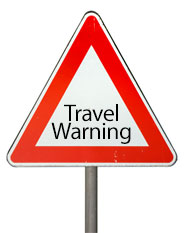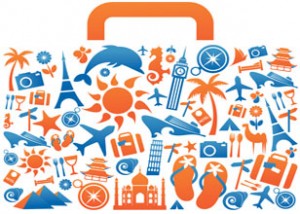 If studying in the US is part of your higher education plans, you’ve probably been working hard to obtain your F-1 student visa. Check out this article on How to Apply for an F1 Visa to learn about the entire application process. Although extensive, most of the F1 visa application steps are straightforward, and if you can afford the fees, finance your education, and hack the academic preparation to score well on your tests, you are probably a good candidate for the F-1 visa. However, not all of the F-1 visa checklist items are based solely on your academics and paperwork. You can also be denied a visa if you blow your F1 visa interview.
If studying in the US is part of your higher education plans, you’ve probably been working hard to obtain your F-1 student visa. Check out this article on How to Apply for an F1 Visa to learn about the entire application process. Although extensive, most of the F1 visa application steps are straightforward, and if you can afford the fees, finance your education, and hack the academic preparation to score well on your tests, you are probably a good candidate for the F-1 visa. However, not all of the F-1 visa checklist items are based solely on your academics and paperwork. You can also be denied a visa if you blow your F1 visa interview.
On paper you might be a solid applicant, but what about in person?
The F-1 visa application will require you to attend an interview at the US consulate. You will have a list of documents and receipts to bring with you to this interview, the absence of which will be detrimental to your chances of visa approval. Additionally, the officer conducting your interview will have the ability to approve or deny your application based on personal questions regarding your plans for study and stay in the US. This part of the interview is very important and can make or break your entire case.
Most questions will be related to these 5 categories:
Knowing what questions to expect can be a huge advantage! You will need to be prepared to answer these questions in such a way that your interviewer is satisfied. If, for any reason, your interviewer believes that you are being dishonest or are in some way unprepared financially, educationally, or culturally for life and studies in the US, they can turn you away without thinking twice. Learn more about Questions to Expect during your F1 Visa Interview here. You should be prepared for these questions ahead of time, and know how you will discuss each subject.
Most important, be open and honest.
Obviously, some interviewers will be tougher than others. Some students simply answer one or two questions and are approved. Some must sit and review every document they’ve brought with them while giving specific details about their family, job, income and future goals, over the course of an hour or more.
If you are well prepared with all of the required documents and receipts, and have thorough, legitimate reasons for applying for the F1 visa, you should have no problem getting through the interview in one piece. This will also help you to remain calm during the interview process.
Take my advice, and don’t blow it! For more information please visit our F1 Visa Insurance section.
 The July 2013 travel warnings are a listing of any warnings that have been posted by the US Department of State in the month of June, warning travelers who plan to visit those countries. Remember to exercise extra care if you are visiting these countries, and check with your travel insurance provider to make sure you still have coverage in place – sometimes coverage can be excluded to countries that are under a travel warning.
The July 2013 travel warnings are a listing of any warnings that have been posted by the US Department of State in the month of June, warning travelers who plan to visit those countries. Remember to exercise extra care if you are visiting these countries, and check with your travel insurance provider to make sure you still have coverage in place – sometimes coverage can be excluded to countries that are under a travel warning.
Countries listed through the month of June 2013 include:
Egypt – 28th June 2013
Due to the continuing political and social unrest, the State Department advises that all non-essential travel to Egypt should be postponed until the situation improves. Political unrest, which intensified prior to the constitutional referendum in December 2012 and the anniversary in 2013 of Egypt’s 25th January Revolution, is likely to continue in the near future due to unrest focused on the first anniversary of the President’s assumption of office.
Somalia – 21st June 2013
The State Department continues to warn against all travel to Somalia as the security situation inside Somalia remains unstable and dangerous. Terrorist operatives and armed groups in Somalia have demonstrated their intent to attack the Somali authorities, African Union Mission in Somalia (AMISOM), and other non-military targets. Kidnapping, bombings, murder, illegal roadblocks, banditry, and other violent incidents and threats to U.S. citizens and other foreigners can occur in any region.
Israel, the West Bank and Gaza – 19th June 2013
The security environment remains complex in Israel and the West Bank, and travelers need to be aware of the continuing risks in these areas, such as the Gaza Strip. Furthermore, with the exception of Jericho and Bethlehem, personal travel to the West Bank by U.S. government employees is prohibited.
Honduras – 17th June 2013
Travelers are warned against travel to Honduras, a country that has the highest murder rate in the world. Tens of thousands of U.S. citizens visit Honduras each year for study, tourism, business, and volunteer work without incident. However, crime and violence are serious problems throughout the country and the Government of Honduras lacks sufficient resources to address these issues. These threats have increased substantially over the past several years and remain high. Incidents can occur anywhere.
Niger – 14th June 2013
The Department of State warns of the risks of travel to Niger, and recommends caution due to ongoing electricity, water shortages and recent terrorist attacks that took place on the 23rd May 2013. The entire river region including the cities of Niamey, Dosso, and Tillaberry is currently experiencing electricity shortages because of damage to a major power line that provides over half of Niger’s electricity, and difficulties with producing and transmitting electricity in Niamey. In addition, as a consequence of the electricity shortage, the Niamey water supplier has been struggling to supply water to the city.
Chad – 11th June 2013
The State Department warns of the risk of travel to Chad, and in particular the Eastern region of Chad and border regions. The security situation in Chad has slowly but steadily improved since the conclusion of an effective peace agreement between Sudan and Chad in early 2010. You should note, however, that despite recent stability, the security environment has been historically volatile and could still deteriorate unexpectedly.
Libya – 7th June 2013
As we reported in our June 2013 Travel Warnings post, on May 8, 2013, the Department of State ordered the departure of a limited number of U.S. government personnel from Libya following the seizure of Libyan government buildings in Tripoli by armed groups in a dispute over a law regarding officials of the former regime. Since that time, tensions have eased, and therefore; as of June 6, the U.S. Embassy in Libya is no longer on ordered departure status but remains an unaccompanied post due to security concerns. The situation in Libya still remains unpredictable, and thus travel is not advised to this part of the world.
Nigeria – 3rd June 2013
The State Department warns of the risks of travel to Nigeria and recommends the avoidance of all travel to Adamawa, Borno, and Yobe states because of the proclamation on May 14, 2013, by the government of the Federal Republic of Nigeria of States of Emergency in those three states. The Department also continues to recommend against all but essential travel to the following states due to the risk of kidnappings, robberies, and other armed attacks: Abia, Akwa Ibom, Bauchi, Bayelsa, Delta, Edo, Gombe, Imo, Jigawa, Kaduna, Kano, Katsina, Kebbi, Niger, Plateau, Rivers, Sokoto, and Zamfara.
While traveling, please keep these June 2013 travel warnings in mind. Additionally, travelers are advised to enroll through the U.S. Department of State’s Smart Traveler Enrollment Program (STEP) to stay up to date on travel security information.
 So you’re traveling abroad to another country and you heard that you should get travel insurance for yourself and wonder do I really need it? And what’s the point of having travel insurance anyway?
So you’re traveling abroad to another country and you heard that you should get travel insurance for yourself and wonder do I really need it? And what’s the point of having travel insurance anyway?
Most people think that its either too expensive, or won’t cover me for what they need. We are here to dispel these myths and answer the question “What’s the point of having travel insurance?”
First, lets check what you know about travel insurance! Most people may think of travel insurance as something that will reimburse you money for your trip cost if your flight or cruise line gets cancelled and you can’t go on your vacation anymore. Well you are partially right! There are varieties of travel insurance plans out there, but most fall into two main categories, trip cancellation insurance and travel health insurance. The point of getting these plans is that you are protected financially if something were to happen either before your trip or during your trip. But there are inherent differences in both plan types and one may be better for you than the other.
Trip cancellation travel insurance is just as you expected, it protects you from losing all your money if, for some unexpected reason, you have to cancel your trip abroad or you have to end your trip earlier than expected. If you or an immediate family member gets seriously sick or hurt in an accident, a natural disaster occurs at your destination or there is a strike – these are some example of things that could occur and trip cancellation insurance would protect you.
The other main type of travel insurance is travel health insurance. These plans are designed primarily to cover you in case you get sick or injured while you are traveling abroad. They are important because in most cases, your insurance back home will not cover you abroad, or if it does, it will only be for a limited amount. Having travel health insurance, means that you can go to the doctor or hospital locally for general accidents and illnesses and they would be covered.
So…. the point of having travel insurance is that these events are covered, and you are protected financially. With trip cancellation you are insuring and protecting your investment in the trip abroad, and with travel health insurance you are protecting yourself from the costs of medical care abroad. Of course, in today’s world there are also hybrid plans that include both types of coverage – but its important to know and have an understanding of travel insurance benefit differences in these plans to help you pick the right coverage for you!
 It seems that as another summer rolls forward, we have yet more summer travel strikes in Europe. Last week we not only had the air traffic controllers in France striking, we also had the French rail network (SNCF) being crippled by strikes at the same time. The air traffic controllers caused the more widespread issues this time, with flights being cancelled coming into and out of France – plus it also affected the whole of Europe as planes were limited in their ability to fly through French airspace.
It seems that as another summer rolls forward, we have yet more summer travel strikes in Europe. Last week we not only had the air traffic controllers in France striking, we also had the French rail network (SNCF) being crippled by strikes at the same time. The air traffic controllers caused the more widespread issues this time, with flights being cancelled coming into and out of France – plus it also affected the whole of Europe as planes were limited in their ability to fly through French airspace.
Coupled with that, we now have news that the Air Berlin pilots have been locked in a pay dispute for the past month, and it looks like July could see them also taking strike action. All these different events, and their timing with the heavy summer travel months means that to the average traveler, you could expect to be hit with delays and cancellations – and I can imagine more will be coming.
As a consumer, of course you can keep an eye on current events and try not to book travel on those airlines that look as though they may be having strike action over the coming months. However this is highly impractical, as in most cases you are booking your travel months in advance and you will have no way of knowing. That is where european travel insurance comes into play, as purchasing travel insurance coverage can cover you in the event of strike action or delays like many passengers experienced last month.
Europe Travel Insurance in particular will be your best option, and for example our Europe Travel plan includes trip cancellation (among other benefits) that would protect you in the event of strike action. You will however want to check the fine print on the insurance policy, as not all travel insurance plans are the same – some may not include trip cancellation insurance, or they may include it but then exclude for strikes – so do you research in advance.
Also be wary about purchasing travel insurance for Europe through your airline or travel provider, although it might be easier – some basic research online will help you find policies that are often more comprehensive and in some cases cheaper!
 Summer is in full swing and many international students will be making their way back home or doing some exploring. Either way, we will all be traveling this summer and so we thought it would be a perfect time to put together our top list of travel gear items to make your trip easier!
Summer is in full swing and many international students will be making their way back home or doing some exploring. Either way, we will all be traveling this summer and so we thought it would be a perfect time to put together our top list of travel gear items to make your trip easier!
Technology is changing, styles are changing – and if you have not looked at the latest and greatest travel items in the past year or two, you might actually be surprised at what you can get now. So here are our top 5 summer travel gear items available today:
Probably some of the coolest bags available at the moment, the Timbuk2 messenger bags not only hold everything you need – such as iPads, Laptops, and documents – but they are also customizable through their website. They are certainly our bag of choice whenever we travel at the moment – comfortable and practical!
What better way to keep all your items together than the GridIt travel organizer. It saves you just throwing everything into your bag, and then having to go digging to find what you need. The grid keeps everything in place, and will save you time when you need to find something.
We all know international travel and your mobile phone do not play nicely, you will either find an extremely large phone bill or you may lose access to the world if you switch your phone and data off. There are new affordable solutions – for example global sim cards if you have an unlocked phone – and if you don’t have an unlocked phone, there are cheap unlocked android phones that now cost around $100. For sim cards, check out the range here and for a cheap android unlocked mobile phone, we use the Sony Xperia EC 1604.
Lets face it, when you travel abroad you are constantly taking photos with your camera and then backing them up to your laptop or tablet whenever you get a chance so that you do not lose anything. Now there are WiFi enabled SD memory cards that connect to WiFi networks when you are in range and automatically back up your photos and makes them available on your smart phone or tablet through the dedicated apps. You then have them at your fingertips to instantly share with friends and family, and you have no need to worry about clumsy wires anymore!
We all know that we need to get insurance, but when it comes down to it, it’s hard to find the time to do the research. In most cases your credit card’s insurance plan will not pay the benefits you need – or provide you with the assistance in case something happens. Save time now and do your research in advance and learn about international travel medical insurance and trip cancellation insurance and learn about which one you will need.
Wherever you are traveling – enjoy your time abroad and if you have other travel gear suggestions, let us know in the comments.
 With over 170,000 J1 visa holders in the USA each month, there are going to be situations where partners will want to bring their significant other, known in the visa world as dependents. If you are traveling on a J1 visa, your spouse or unmarried child (under the age of 21) typically arrives on a similar visa as dependents of the J1 visa, called the J-2. This is similar to the J1 visa in that it allows you to travel and live in the USA for a defined period of time.
With over 170,000 J1 visa holders in the USA each month, there are going to be situations where partners will want to bring their significant other, known in the visa world as dependents. If you are traveling on a J1 visa, your spouse or unmarried child (under the age of 21) typically arrives on a similar visa as dependents of the J1 visa, called the J-2. This is similar to the J1 visa in that it allows you to travel and live in the USA for a defined period of time.
J-2 Eligibility
Dependents of the J1 visa include a spouse or child under the age of 21, but it does not extend beyond these two categories and would exclude parents, siblings, grandparents, etc. Not all programs allow the J1 holder to bring dependents, so be sure to check to see if your program is eligible.
Travel
When it comes to travel, many of the same rules that apply to a J1 visa holder also applies to the J-2 visa. The duration of stay in the US, for example, is the same under both visas and while the J-2 visa holder cannot arrive in the US in advance of the J-1 holder, once admitted in the US they do not need to be accompanied by the J1 holder when leaving and reentering the US.
Study
Under the J-2 visa, dependents can become a full-time or part-time degree-seeking student, and can choose to stop their program at any time. J-2 dependents who find that their academic program extends beyond their J-2 status in the US can switch their status to a F-1 (international student) .
J-2 Insurance
The US Department of State requires that J-1 visa holders obtain a specified amount of coverage. These same health insurance requirements also apply to J-2 dependents and will be required throughout the duration of their stay.
Work Authorization
Like J-1 visa holders, J-2 dependents can also accept financial support for work as long as they’ve received an employment authorization from the US Citizenship and Immigration Services. Those interested in working will need to submit Form I-765 after arrival in the US, wait approximately 3-5 months for processing and will receive their EAD authorizing work up to one year.
 Pursuing a higher education abroad allows individuals to not only gain insight into concepts of the educational world that may have never otherwise never been conceived, but to also experience the everyday unknown. For many, it’s the chance to live away from home, develop new relationships and discover what path in life they want to take. While this is exciting and a chance of a lifetime, it’s important that students not only make plans for their next big adventure, but also plan for the unexpected.
Pursuing a higher education abroad allows individuals to not only gain insight into concepts of the educational world that may have never otherwise never been conceived, but to also experience the everyday unknown. For many, it’s the chance to live away from home, develop new relationships and discover what path in life they want to take. While this is exciting and a chance of a lifetime, it’s important that students not only make plans for their next big adventure, but also plan for the unexpected.
One of the best ways to prepare is finding an international student health insurance plan that not only protects you, but also works for you!
Students who come from a country where purchasing health insurance is not the norm may be overwhelmed at first when trying to answer questions about what is student insurance. International students who have a few moments to spare can sit back, continue reading and walk away with the answer to what is student insurance.
The first step in figuring out what is student insurance is to know that this insurance is primarily purchased to prepare for the unexpected. While some plans have coverage for wellness, such as general check-ups and immunizations, these are not typically included in international student health insurance plans. However, students will want to make sure their plan includes coverage for illness and injury including the following key benefits:
Depending on the situation, students may also require other benefits beyond this. Schools often have coverage requirements that students will need to meet. A few of the most commonly required benefits include maternity, mental health and coverage for pre-existing conditions after a reasonable waiting period.
Upon purchasing an insurance plan, students will pay a premium for the plan. The frequency of payment will vary from plan to plan, it may be required up front or monthly- it all depends on the plan. After the first premium, students will then receive their insurance documents which are typically used to show their school proof of health insurance.
When discovering the ins and outs of student insurance it’s important to understand what the insurance will cover and what the insured will be expected to contribute- the premium may not be the only payment associated with the health insurance plan when the individual receives medical care. Plans typically have a co-pay, deductible or co-insurance. When comparing plans, students should look at the benefits but also what out of pocket expense they will be required to fulfill upon a trip to the doctor’s office or hospital.

International Student Insurance provides health insurance for students studying at Florida State University (FSU). Learn more about your insurance options online.
As an international student studying in the USA, your school will most likely require you to show proof of international student health insurance coverage prior to enrolling in classes. In some cases, they will even provide you with an insurance plan that meets their requirements – but often these plans can be very expensive and there are better, more affordable options that you can use during your studies.
If you are an international student at Florida State University in 2020/2021, you have the option to waive out of your schools health insurance plan and purchase alternative coverage that still meets their requirements. Florida State set out their comparable coverage requirements for international students in where you can see all the 15 points that they want your insurance plan to meet – if you can meet all those points, you are eligible to waive out of your schools insurance plan.
While the Florida State insurance plan is an excellent solution, you can save money and purchase a comparable plan such as the Budget, Select and Elite plan of our Student Health Insurance plan. Not only will these plans meet all the requirements, it will also save you money! For example, a student age 24 and younger:
Saving you more than $2,000 per year on your student health insurance coverage!
The insurance plan offered at Florida State also does not offer intercollegiate sports coverage, but our international student health insurance plan will! To learn more about our Student Health Insurance plan, please visit our website or contact our customer service team who will be more than happy to assist you. You can also learn more about about the Florida State University insurance requirements here.
Updated August 5, 2020